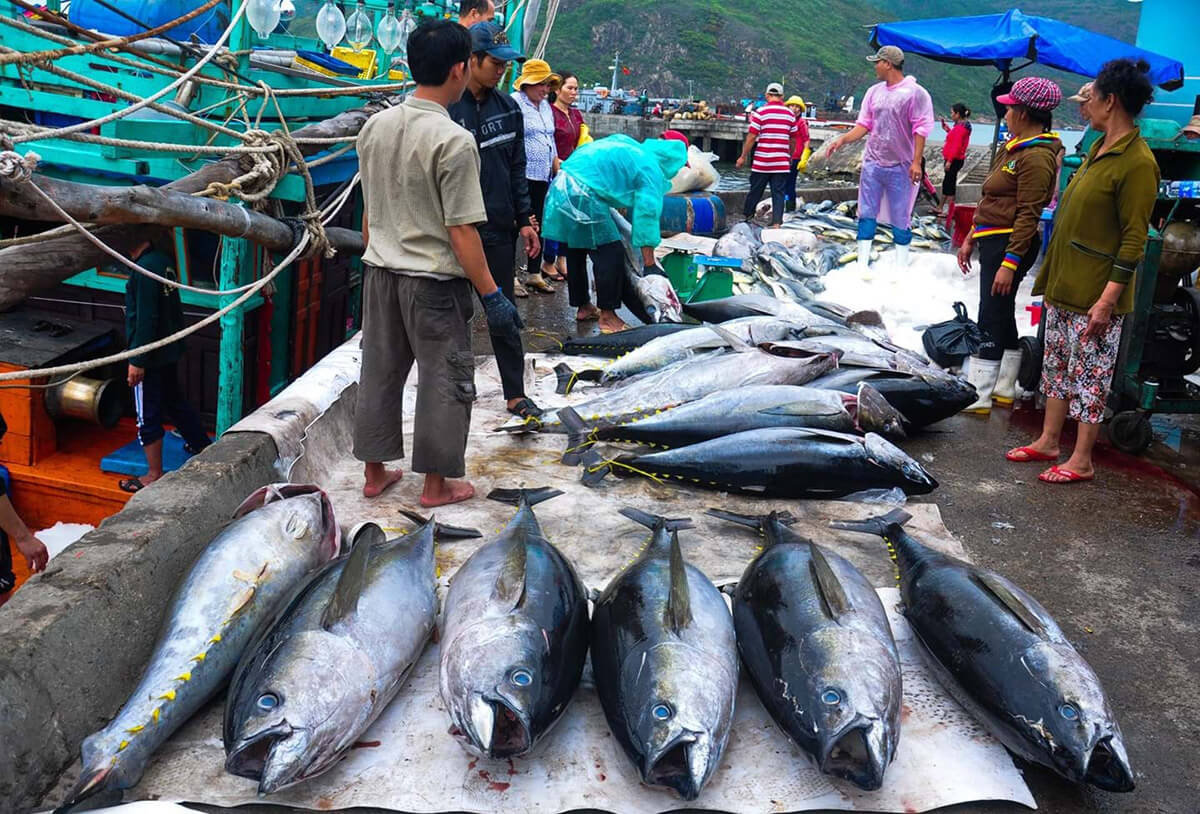The Association of Seafood Exporters and Producers (VASEP) said that after 3 consecutive months of decline, Vietnam's tuna exports to the UK have increased again. In June 6 alone, tuna exports to this market increased by 2024%, reaching 56 million USD.
However, the high growth rate in the past 2 months is still not enough to compensate for the previous decline. Cumulatively in the first 6 months of 2024, tuna export turnover to this market reached 3,6 million USD, down 5% over the same period.
Frozen tuna meat/loin is still Vietnam's main export product to the UK market, accounting for 92%. Vietnam is currently the second largest non-EU source of frozen tuna meat for the UK market, after South Korea.

Also according to VASEP, in the UK market, tuna is sold in many types of products such as pre-processed, pre-processed, sushi, sauced, breaded or breaded... Among them, canned and canned tuna products are most consumed bags. However, consumption of this product group has been trending down since last year.
On the contrary, consumption of tuna products in the form of sushi or breaded tuna tends to increase. Therefore, this is an opportunity for countries to increase exports of processed and canned tuna products.
A report from the Import-Export Department (Ministry of Industry and Trade) said that in terms of processed and canned products, tuna is the top choice of British consumers. According to Seafish statistics, 69% of British people's choices in canned seafood are tuna products. In addition, due to the characteristics of fatty fish that are quite suitable for many forms of processing, a number of other processed tuna products such as salads, toppings, bread, etc. are also very popular in Vietnam. this market.
Similar to other markets in the European region, consumers in the UK also tend to pay attention to not only the origin and quality of products, but also to labor and environmental factors. market, or the sustainability of the value chain in production and product supply. Other basic factors such as price, processing method, similarity in meals, and location of use are also taken into account.
However, in the UK market, Vietnamese tuna products are competing with similar products from Ecuador, because Ecuador has signed a free trade agreement (FTA) with the UK. This is creating favorable conditions for this country to increase exports to the UK. With a powerful fleet, the supply of pure origin tuna for Ecuador is quite abundant. Therefore, Ecuador has many opportunities to boost exports to this market.
Meanwhile, according to VASEP, fishing output in Vietnam is inherently much lower than other countries due to the lower fishing capacity of the fleet. In addition, regulations limiting the size of skipjack tuna allowed to be exploited are causing yields to become increasingly lower.
However, according to the Import-Export Department, Vietnamese tuna has an advantage in the UK market thanks to tariff incentives from the Vietnam - UK Free Trade Agreement (UKVFTA). According to commitments in the UKVFTA Agreement, regarding tariffs, this agreement has a mechanism to continue the EVFTA Agreement, meaning that import tariffs on fresh and frozen tuna products will be quickly eliminated. .
The tax rate on frozen tuna products or fillets will be eliminated over a period of 3 years from 18% to 0%. For processed tuna used for canned tuna – the 24% base rate will be reduced over a 7-year schedule.
For canned and packaged tuna, the quota will be 11.500 tons per year which will be duty-free. After that, the original tax rate of 20,5% will be applied, which will decrease by 3,5% each year. “With this agreement, Vietnamese tuna products have an advantage in the UK market” – The Import-Export Department informed and added that to enjoy preferential tax rates as committed in the UKVFTA Agreement, Vietnamese seafood products must prove their origin.
Regulations on Rules of Origin in the UKVFTA are similar to the EVFTA, with the origin criteria for raw seafood and processed seafood in the UKVFTA being pure origin. This means that raw, semi-processed and processed aquatic products for export from Vietnam are considered originating under the UKVFTA Agreement when the aquatic raw materials used in the production process originate solely from Vietnam. (born or raised, caught and processed entirely in Vietnam), are not allowed to be imported from third countries outside the agreement.
Therefore, to promote tuna products to the UK market, according to experts, Vietnamese businesses need to increase the application of science and technology, develop modern production and processing systems, from there. Optimize the production process to improve quality and added value to products, helping Vietnamese seafood gradually move towards international standards and create a competitive advantage.
Along with that, diversify export products and increase deeply processed products. Select market segments and distribution channels appropriate to the products and scale of the business; Focus on understanding tastes and market characteristics.